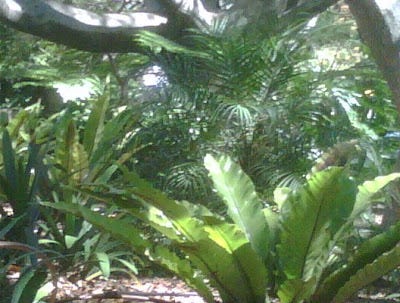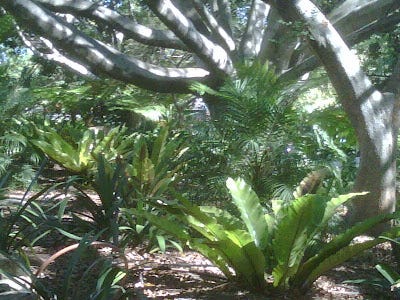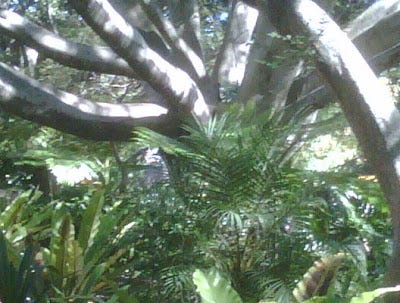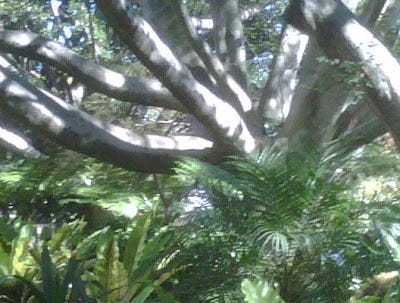*

In Sydney, by the spent aquarium-flare
Of penny gaslight on pink wallpaper,
We argued about blowing up the world,
But you were living backward, so each night
You crept a moment closer to the breast,
And they were living, all of them, those frames
And shapes of flesh that had perplexed your youth,
And most your father, the old man gone blind,
With fingers always round a fiddle's neck,
That graveyard mason whose fair monuments
And tablets cut with dreams of piety
Rest on the bosoms of a thousand men
Staked bone by bone, in quiet astonishment
At cargoes they had never thought to bear,
These funeral-cakes of sweet and sculptured stone.
Where have you gone? The tide is over you,
The turn of midnight water's over you,
As Time is over you, and mystery,
And memory, the flood that does not flow.
You have no suburb, like those easier dead
In private berths of dissolution laid -
The tide goes over, the waves ride over you
And let their shadows down like shining hair,
But they are Water; and the sea-pinks bend
Like lilies in your teeth, but they are Weed;
And you are only part of an Idea.
I felt the wet push its black thumb-balls in,
The night you died, I felt your eardrums crack,
And the short agony, the longer dream,
The Nothing that was neither long nor short;
But I was bound, and could not go that way,
But I was blind, and could not feel your hand.
If I could find an answer, could only find
Your meaning, or could say why you were here
Who now are gone, what purpose gave you breath
Or seized it back, might I not hear your voice?
I looked out my window in the dark
At waves with diamond quills and combs of light
That arched their mackerel-backs and smacked the sand
In the moon's drench, that straight enormous glaze,
And ships far off asleep, and Harbour-buoys
Tossing their fireballs wearily each to each,
And tried to hear your voice, but all I heard
Was a boat's whistle, and the scraping squeal
Of seabirds' voices far away, and bells,
Five bells. Five bells coldly ringing out.
Five bells.
FIVE BELLS, Kenneth Slessor's elegy for his friend Joe Lynch, who drowned in Sydney Harbour in 1927, is arguably the most famous poem written about Sydney.

Vicious souls and manufactured hysterics, the dark forces of government and the evil spin meisters, they came often, they came early, they circled the camp and there was no reasoning with them. He had only heard stories, having been born well after the last major attack. The legends had placed them as wraiths, unreasonable beings, as ghostly shrouds. Despite his size, despite his prowess as a warrior, he was frightened. Although the rest of the villagers were looking up to him for protection, he had to admit it to himself, standing alone there at the edge of their circle of grass thatched houses, listening to the forest for any signs of danger approaching. There were booby traps everywhere, but he did not really expect them to work, not if what he had heard was true. This was not a situation where dignity, self worth, his powerful frame, his status as a village elder, would help. He was cold, and pulled his jacket tighter around his frame.
The dogs howled. Restless, irritable, discontent. No one took any responsibility for anything. These spirits could slag men off with impunity; and no one would move to defend them, or to shut down the hate speech. Easily manipulated, dangerously compliant journalists reported the hysteria as if it was real. He remained shocked at the brutality, the juvenile viciousness, of these things. How dark is the hour? How fast are the forces mustering? How sad to see everything they had worked so hard for disappearing with the stroke of a pen. Our elected representatives did not answer their phones. Cold crisis, cold comfort, there had been so many different lives. As he stood on the wharf in Singapore, watching the sun rise, still drunk from the copious quantities of alcohol he had consumed in the pier restaurant. Snickering soldiers. Let's go down Boogy Street.
Let's escape everything. Let's go down a different path. Let's avoid every emotional confrontation, for to feel is to hurt. It was wonderful to be at least partially grounded, not to have to rely on the church, or the meetings, or the kindness of strangers. Not to die a street alcoholic. Not to muster the shadows; not to be warned of salvation. The homeless man who had been hanging around Newtown, who he had always spoken to and occasionally given money to in return for keeping an eye on his car, began talking to him. Although difficult to understand, he was strangely lucid for a street person. While he occasionally saw him drinking, he did not appear to be drunk, and in essence was one of those people who prefer to sleep rough. It's cold at night, he said from inside his mountain of filthy clothes. Cold. Too cold. Where you sleeping, he asked? And the answer was garbled, imprecise, but he gathered it was in some sort of culvert or alcove near the railway lines, a little cave that only he could find.
The Rudd government has made homelessness a priority, one of their many priorities in a scatter gun approach which involved so much spin people had begun to seriously doubt their integrity. Turnbull over reached, calling for Rudd's resignation over the slightest thing; and now the dogs were baying in every direction, in an unquiet peace, the dogs barking in the village. He could hear them coming and he remained frozen. He knew he was going to die. The howling of the dogs grew louder, and sleepy, concerned villagers began spilling out of their homes and tents, worried about what was happening. He was quickly joined by other young men, their spears in hand. The shadows of the wraiths moved through the forest; a deathly chill of an ancient evil passing through them all. They had not been thus tested for three generations, and the desire for peace was strong amongst them. It was not to be. The phantasms moved quickly, and now he could see the shadows themselves in the forest, moving faster, faster.
He said to the homeless man, I'll try to help you, I think I know someone who can help. He had heard the convoluted tale of his approaches to the Department of Housing, but without a home and without a phone, how could they contact him even if it was true? He claimed he was on some sort of waiting list, waiting for a home. All he wanted to do was come in for a while, out of the cold of winter, away from the new breed of youngsters who were likely to bash him. This stranger who was talking to him, who he regarded as an important man, a man of stature, a man with a home, was promising to do something, and he sat on the door step of a terrace next to the Glengarry and waited for him to appear. The man would make the phone call, he would get a home, he would have a place of his very own. He might even get a heater. The ancient terrors were still there, just out of sight, but in the modern world there were little boxes where people could hide, could dwell, where no one could get to them. It was shocking, he had to admit that. But between ancient fears and modern perils, it was as if his head had been spiked on a pole, as if the world was ridiculing him and there was nowhere to hide, as if here, too, in every place and every time, things were going savagely wrong. The wraiths went straight for his throat.

THE BIGGER STORY:
http://www.guardian.co.uk/world/2009/jun/22/iran-protests-revolutionary-guard
Revolutionary guard warns Iran protesters to be 'prepared for confrontation'
Military force threatens 'rioters' as authorities admit irregularities in presidential vote occurred on wider scale than disclosed
Iranian security officers pass burning debris on a Tehran street during clashes on Saturday. Photograph: Reuters
Iran's revolutionary guards today threatened to crush any further opposition protests as the authorities admitted irregularities in the disputed presidential vote had occurred on a much wider scale than previously disclosed.
The country's most powerful military force ordered demonstrators to "end the sabotage and rioting activities" and said their resistance was a "conspiracy" against Iran.
A statement posted on the revolutionary guards' website warned protesters to "be prepared for a resolution and revolutionary confrontation with the guards, Basij and other security forces and disciplinary forces".
Earlier, Iran's powerful guardian council – which last week agreed to investigate some voting complaints – admitted that irregularities were found in 50 constituencies, but claimed this had no effect on the result.
A council spokesman, Abbas Ali Kadkhodaei, was quoted on the state TV website as saying the investigation showed more votes were cast in these constituencies than there were registered voters.
http://www.brisbanetimes.com.au/national/ozcar-battle-blows-up-in-turnbulls-face-20090622-ctur.html
All it took was four days to turn up a fake.
What began as the first major political crisis for the 19-month-old Rudd government with calls for the prime minister and treasurer to quit because of corrupt behaviour has blown up in Opposition Leader Malcolm Turnbull's face.
Australian Federal Police, called in by the government on Saturday, found that an email linking Prime Minister Kevin Rudd's office to lobbying on behalf of a car dealer friend of the prime minister's was a fake.
By early Monday afternoon the firestorm known as ute-gate had leapt from licking at the feet of Rudd and Treasurer Wayne Swan to engulf Turnbull and his own office.
Police searched the Canberra home of Treasury official Godwin Grech and were keen on interviewing a former adviser to Turnbull who left the leader's office some weeks ago.
Grech is the public servant who was in charge of OzCar, the special purpose operation set up to provide finance for car dealers after two US providers, GE and GMAC, departed the local market late last year.
At the heart of the opposition's argument is the allegation that Rudd and Swan abused their positions by using their offices to assist Ipswich Kia dealer John Grant get access to the OzCar scheme.
http://news.bbc.co.uk/2/hi/middle_east/8112504.stm
Iraqi police say early morning bomb attacks have killed at least 11 people in different areas of Baghdad.
A car bomb exploded on the road to the government compound known as the Green Zone killing at least five people.
Another attack in the eastern Sadr City area killed three students on a minibus as they were on their way to an exam.
The rush-hour explosions come days before US troops are due to withdraw from Iraqi cities under a security pact with the Iraqi government.
Reports say at least 62 people have been injured in Monday's bombings.
In addition to the explosions in Karrada and Sadr City, which was caused by a roadside bomb in Hamza Square, there was another roadside bombing in Shaab neighbourhood in north-east Baghdad which killed three people and wounded another 30.
There are also early reports of a suicide attack west of Baghdad, although details were not immediately available.
Attacks in and around Baghdad are common, despite an overall drop in violence in Iraq.
On Saturday, a bomb attack near the northern city of Kirkuk killed 72 people - the deadliest in Iraq for more than a year - and injured another 200.
The US plans to withdraw its troops from Iraqi cities and major towns by 30 June, and is due to end combat operations across Iraq by September 2010, leaving Iraqi security forces to cope alone.




